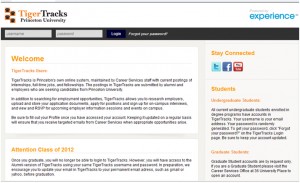Don’t call 411. If you’re deciding if you should pursue an internship this summer, there’s a simple answer.
Go for it.
 To those unacquainted, internships are the star power of a job world that’s way tougher than Nintendo 64. They’re excellent ways to explore possible career fields as well as build experience and workplace skills. It’s best to have one to two internships under your belt by the time you graduate. Often, recruiters will even prefer candidates that have experience in two internships.
To those unacquainted, internships are the star power of a job world that’s way tougher than Nintendo 64. They’re excellent ways to explore possible career fields as well as build experience and workplace skills. It’s best to have one to two internships under your belt by the time you graduate. Often, recruiters will even prefer candidates that have experience in two internships.
Here’s the no-brainer list. Make sure you know the following before moving on to the next level:
Level Zero: THE QUESTIONS PHASE. Every young child goes through this phase. So does every internship seeker, so before proceeding, consider the following:
- What careers pique my interest?
- Am I interested in a particular type of organization, i.e. government or nonprofit?
- What do I want to do on the job? Usually you’ll do one or more of the following—research, conduct office activities, assist planning, write, work in a lab, and problem solve.
- Where do I want to be?
- Are dollars important to me? (i.e. Do I want to get paid?)
Level One: THE BASICS. You’re ready to go. Now for some updates.
- Read Career Services’ weekly CareerNews e-mail every Monday for a list of opportunities and deadlines as well as workshops and events to help you build the job search skills you need.
- Update your resume and draft a cover letter. If you need a “cheat sheet” check out the Career Planning Guide.
- Practice your interviewing skills, and not just to the mirror– although that works, too. Attend workshops or schedule a mock interview to identify your strengths and weaknesses.
Level Two: THE SEARCH. Welcome to the stage of the furrowed brows, Nicholas Cage-style. This, actually, is the fun part.
- Reach out to alumni to research opportunities. They really want to help you!
- Network: It’s the best method out there. Friends, family members, past coaches or teachers. Talk to them and see if they have any suggestions. Freshmen, this is especially a great tactic for you!
- Talk with employers….at career fairs and information sessions. It’s a great way to get face-to-face contact and practice your elevator pitch.
- Search for internships on TigerTracks and UCAN.
- Check out some of the many other internship specific and industry sites on the Career Services website:
— General Internship Sites
— Internships within the Arts & Museums
— Internships within Communications, Publishing or Entertainment
— Internships in Environmental Careers
— Internships within Law and Government
— Internships within Nonprofit
— Internships within Science, Engineering, or Health
— Internships within Sports Field
— More Industry Specific Sites
 Your bright, shiny new internship is just around the corner. Don’t forget to follow up with employers 10-14 days after applying. It is not too late to continue applying in April. There are still plenty of internship postings coming in to Career Services; some are just waiting for someone (like you, perhaps) to fill them!
Your bright, shiny new internship is just around the corner. Don’t forget to follow up with employers 10-14 days after applying. It is not too late to continue applying in April. There are still plenty of internship postings coming in to Career Services; some are just waiting for someone (like you, perhaps) to fill them!



